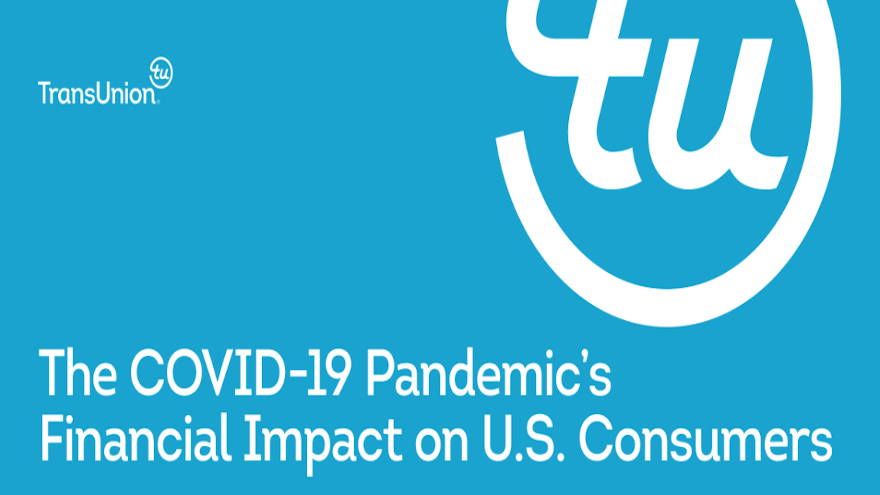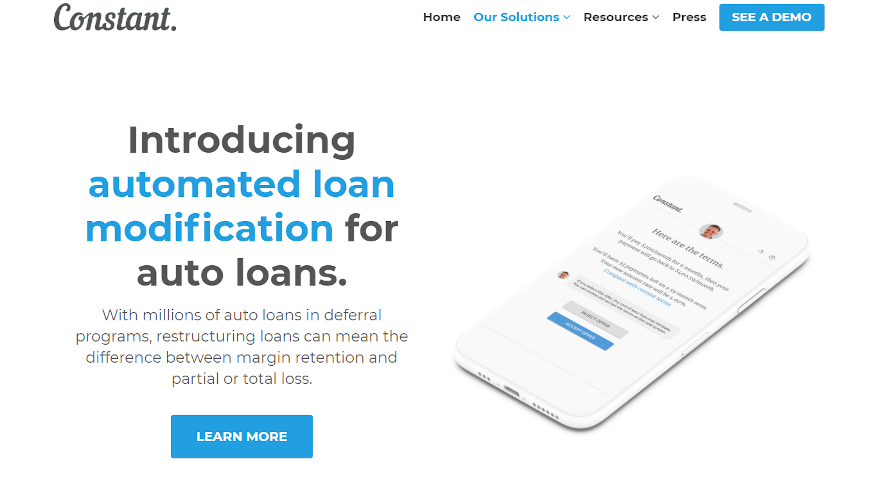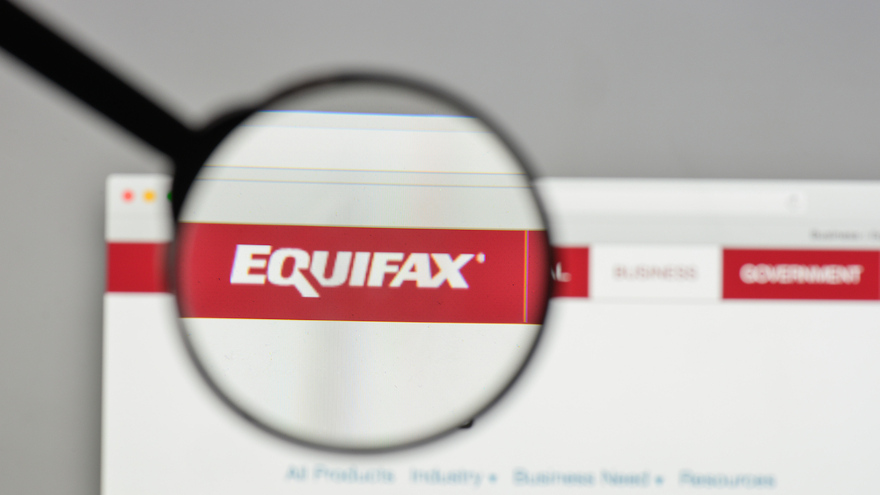TransUnion updated the industry on multiple fronts on Thursday, giving the latest reading not only on delinquencies but also the total percentage of accounts in “financial hardship.”
As auto-finance 60-day delinquencies made a notable upturn during the second quarter — especially among finance companies that might have subprime paper in their portfolio — TransUnion reported accounts with that “financial hardship” status dropped in July, marking the first such decrease since the start of the COVID-19 pandemic.
The report defines accounts in financial hardship by factors such as a deferred payment, forbearance program, frozen account or frozen past due payment.
TransUnion found that while fewer accounts are in financial hardship status as of late, analysts indicated overall credit performance has continued to hold steady and has not shown a material deterioration.
To gain greater insight into the performance and payment behaviors of consumers during the COVID-19 pandemic, TransUnion has supplemented its quarterly Q2 2020 Industry Insights Report with its Monthly Industry Snapshot Report, highlighting the consumer credit market for the month of July.
“Overall, the consumer credit market has been performing quite well despite the obvious challenges brought on by the COVID-19 pandemic,” TransUnion vice president of research and consulting Matt Komos said in a news release.
“It’s a reassuring sign that delinquency levels have remained relatively low — especially as the percentage of consumers in financial hardship status has started to decline,” Komos continued. “While we still expect to see future delinquencies rise based on macroeconomic factors, it is clear that government stimulus programs and accommodation programs provided by lenders are helping the market withstand these challenges in the near-term.”
Accounts in Financial Hardship Status Declining
| Timeframe |
Auto |
Credit Card |
Mortgage |
Personal Loans |
| July 2020 |
6.16% |
2.83% |
6.15% |
6.92% |
| June 2020 |
7.20% |
3.57% |
6.79% |
7.03% |
| May 2020 |
7.04% |
3.73% |
7.48% |
6.15% |
| April 2020 |
3.54% |
3.22% |
5.00% |
3.57% |
| March 2020 |
0.64% |
0.01% |
0.48% |
1.56% |
| July 2019 |
0.41% |
0.01% |
0.75% |
0.25% |
* TransUnion’s financial hardship data includes all accommodations on file at month’s end, and includes any accounts that were in accommodation prior to the COVID-19 pandemic. Source: TransUnion.
More details about auto financing
Looking specifically at auto financing, TransUnion pointed out that providers began tightening their underwriting criteria as performance started to show initial signs of deterioration during the second quarter.
TransUnion found that consumer-level delinquencies — 60 days or more past due — reached 1.50% in Q2, an increase of 27 basis points from year-ago quarter and the largest such increase from the previous 11 quarters.
While overall delinquencies saw an uptick, analysts noticed that banks, captives and credit unions have experienced a downward monthly trend in delinquency since the pandemic began.
Conversely, independent finance companies — which oftentimes book subprime paper — have been experiencing a monthly increase in 60-day delinquency, according to TransUnion.
Analysts explained this recent deterioration in performance, along with economic stressors presented by the COVID-19 pandemic, has resulted in finance-company pullback across all risk tiers, but has been primarily driven by subprime and near prime.
TransUnion reported that overall originations declined 5.8% year-over-year for a total of 6.3 million new contracts.
“Traditionally auto loans have been a payment that consumers make even in times of economic distress as a vehicle is the main source of transportation and the lifeblood for many consumers in their daily lives,” said Satyan Merchant, senior vice president and automotive business leader at TransUnion.
“While there has been some recent deterioration in terms of auto performance, this may be the result of consumers having less cash flow as stimulus funds begin to run out,” Merchant continued in a news release. “Lenders are likely to continue monitoring delinquency levels — especially as accommodations expire or stimulus benefits run out — to determine future risk mitigation strategies across the portfolio.”
Q2 2020 Auto Loan Trends
| Auto Lending Metric |
Q2 2020 |
Q2 2019 |
Q2 2018 |
Q2 2017 |
| Number of Auto Loans |
83.5 million |
82.7 million |
80.9 million |
77.4 million |
| Borrower-Level Delinquency Rate (60+ DPD) |
1.50% |
1.23% |
1.22% |
1.23% |
| Average Debt Per Borrower |
$19,457 |
$18,974 |
$18,700 |
$18,486 |
| Prior Quarter Originations* |
6.3 million |
6.7 million |
6.8 million |
6.7 million |
| Average Balance of New Auto Loans* |
$22,372 |
$21,418 |
$20,901 |
$20,415 |
*Note: Originations are viewed one quarter in arrears to account for reporting lag. Source: TransUnion
Additional insights about financial hardship
TransUnion acknowledged the percentage of accounts in financial hardship appeared to hit their peak during the months of May and June, a time when many consumers were feeling the combined impacts of reduced work hours, shelter-in-place orders, unemployment and dwindling stimulus funds.
Analysts explained the recent reduction in account hardship levels may indicate that the number of consumers in financial distress has leveled off as performance for these products has maintained steady levels.
TransUnion reported serious delinquencies (60 to 90 days past due) showed a month-over-month improvement from June to July across most credit products. Credit card, mortgage and personal loans also showed a substantial year-over-year decline in delinquency compared to performance in July of last year.
“The presence of federal programs and those provided by lenders, however, may have alleviated some of the financial hardship borrowers are facing,” TransUnion said.
| July Industry Snapshot of Consumer-Level Delinquency Performance by Credit Product |
| Percentage of Borrowers 60 or More Days Past Due (DPD) |
| Timeframe |
Auto |
Credit Card |
Mortgage |
Personal Loans |
| July 2020 |
1.43% |
1.37%* |
1.08% |
2.79% |
| June 2020 |
1.50% |
1.48%* |
1.07% |
3.11% |
| July 2019 |
1.31% |
1.61%* |
1.41% |
3.10% |
| Percentage of Borrowers 30 or More Days Past Due (DPD) |
| Timeframe |
Auto |
Credit Card |
Mortgage |
Personal Loans |
| July 2020 |
3.00% |
2.58% |
1.81% |
3.77% |
| June 2020 |
3.17% |
2.66% |
1.83% |
4.34% |
| July 2019 |
3.74% |
3.52% |
2.68% |
4.6% |
*Credit card delinquency rate reported as 90+ DPD per industry standard; all other products reported as 60+ DPD. Source: TransUnion.
TransUnion went on to mention that another positive sign from the report can be found via the 30-day delinquency metric, typically an early red flag that an account will default and potentially be charged off. These delinquency levels have shown signs of improvement in the month of July across auto, credit card, mortgage and personal loans compared to June as well as one year ago.
Despite this indication that consumers are not falling behind on payments, TransUnion noted that consumers are still expressing concern about their ability to pay bills.
TransUnion’s latest Financial Hardship Survey from late July found that 57% of Americans have been financially impacted by the COVID-19 pandemic. Of those consumers, 77% said they are concerned about their ability to pay bills and loans. They expect they will not be able to pay their bills or loans in about six weeks and anticipate an average budget shortfall of around $875.
The level of concern is now at its highest level since TransUnion began tracking this variable in late March.
“As more accounts come out of financial hardship status, lenders will be actively monitoring payment behaviors to gauge whether consumers can withstand these economic pressures and do so without government assistance or lender support. How consumers are able to manage debt levels and access to credit will be a key indication of economic recovery in the coming months,” Komos said.
TransUnion’s Q2 2020 Industry Insights Report and Monthly Industry Snapshot Report features insights on consumer credit trends around personal loans, auto financing, credit cards and mortgage loans.
For more information, managers can register for the TransUnion Q2 2020 IIR Webinar on this website. Additional resources for consumers looking to protect their credit during the COVID-19 pandemic can be found at transunion.com/covid-19.
Fintech and automated loss mitigation provider Constant rolled out an enhancement to its solution aimed at helping finance companies limit delinquencies and charge-offs as they navigate through modifications offered because of the coronavirus pandemic.
The company launched AutoCare, a module on its cloud-native Software as a Service platform intended to fend off delinquency and prevent involuntary repossessions.
AutoCare is designed to tackle the most complex part of offering a contract modification: determining willingness and ability to pay. Constant’s software can provide finance companies with a real-time view of a contract holders’ financial situation through multiple data sources — avoiding credit blind spots — determining their ability to pay and presenting a sustainable relief option based on investor rules that can be accepted and signed, all in minutes.
AutoCare also includes a fully automated voluntary repossession feature for contract holders not able to retain their vehicle.
“Historically, it has not been cost-effective to offer mortgage-style hardship relief for small-dollar loans,” Constant president and chief operating officer Carissa Robb said. “The timeline to collect and record a total loss is shorter for auto loans, as compared to real estate secured loans. As relief options tighten, delinquency worsens and charge offs accelerate, few relief options are available to restructure and return borrowers to performing. Until now.
“Offering mortgage-style relief options on auto loans can help reduce delinquency roll rates, charge-offs and bankruptcy,” Robb continued. “Where appropriate, offering non-retention options like an automated repossession tool that allows borrowers to voluntarily surrender their vehicle if a workout option is not appropriate, protects asset value.
“By offering a 24/7 self-service option to engage with the borrower and incorporating their responses into a complex, proprietary decision engine, lenders are able to understand the duration and severity of a financial hardship,” Robb went on to say. “This precision allows for an appropriate recommendation to manage the outstanding debt, with the least amount of disruption to the customer and the lender.”
For more details, go to https://www.constant.ai.
How about this for a change in our coronavirus-impacted world? Experts noticed some consistency in the latest auto-finance trends.
According to July auto-finance data Edmunds compiled and shared with SubPrime Auto Finance News, metrics such as term and the amount financed for both used- and new-vehicle financing held steady on a sequential basis.
And as of July 13, Equifax also told SubPrime Auto Finance News that portfolios continue to grow as the number of outstanding retail installment contracts stood at 79.19 million, up 1.6% from the previous week.
The balances connected with those contracts came in at $1.266 trillion, according to Equifax, also marking a 1.6% rise from July 6 to July 13.
Edmunds indicated that average used-vehicle finance terms for paper booked in July came in at 67.4 months with the average down payment registering at $3,722, resulting in the average balance coming into a portfolio being $22,702. For June, Edmunds reported those figures were 67.3 months, $3,167 and $22,337.
On the new-car side, Edmunds pegged the average term for paper financed in July at 70.1 months with $4,486 in average down payment and an average balance of $34,733 coming into a portfolio. In June, Edmunds had those new-vehicle financing averages at 69.9 months, $4,451 down and $34,911 in outstanding balance.
Perhaps what might be even more encouraging are the delinquency readings Equifax shared.
Again as of July 13, Equifax said the severe delinquency rate — the share of balances 60 days or more past due stood at 0.89%, representing a 2.4% decrease from the previous week and 34 basis points lower than what analysts spotted at the end of February.
“Overall, delinquency rates have been rising slowly over the past nine years (since 2011) with regular seasonal variations. Relative to historical values delinquencies are still low, less than rates seen in the first quarter of 2010,” Equifax said while mentioned the recession peak delinquency rate was 1.58% in February 2009.
Delinquency rates on auto financing declined during the first quarter, according to Experian’s latest State of the Automotive Finance Market Report.
But Experian experts acknowledged the metrics might be ripe for change as the automotive industry grapples with the impact of COVID-19 and financial hardship felt by consumers.
What might be most noteworthy for finance companies that specialize in subprime paper is this tidbit. Experian reported on Tuesday that subprime financing made up 22.52% of total auto financing, which is a historic low for the first quarter of the year.
Meanwhile, Experian determined 30-day delinquencies decreased from 1.98% in Q1 of last year to 1.93% in Q1 of this year, while 60-day delinquencies dropped from 0.68% to 0.67% during the same time frame.
“The decrease in delinquency rates is a positive sign for the industry, though it’s important to recognize other factors may have attributed to the trend,” said Melinda Zabritski, Experian’s senior director of automotive financial solutions.
“For example, COVID-19 wasn’t declared a national emergency until mid-March,” Zabritski continued in a news release. “Add to that, some consumers are likely leveraging financial resources and assistance programs, such as stimulus checks, to manage through financial hardship, so its true impact may not be evident until the months ahead.”
To better assess COVID-19’s early impact on the industry, Experian also analyzed finance trends during the month of April. This data showed new-vehicle title changes dropped 50.8% compared to the previous year, while used-vehicle title changes dropped 54% over the same time period.
Analysts pointed out that additional findings showed a decrease in leasing year-over-year, with 24% of new vehicles being leased in April of this year, compared to 30% in April of last year.
Experian also mentioned affordability was a point of industry conversation prior COVID-19 and will likely remain so as consumers navigate their current financial situations over the coming months.
Analysts determined the average amounts financed continued to increase in Q1, with the average new-vehicle contract amount reaching $33,739 and the average used-vehicle contract amount clocking in at $20,723.
Experian indicated these increases reflected in average monthly payments as well, as the average new-vehicle payment increased from $554 in Q1 of last year to $569 in Q1 of this year. The report also showed average used-vehicle payments ticked up by $8 year-over-year, from $391 to $397.
Experian went on to note that as vehicle financing amounts continue to grow and consumers look for the most affordable options, the trend of prime consumers opting to finance used vehicles continued.
In fact, analysts discovered prime consumers comprised 50.47% of used-vehicle financing in Q1.
According to the report, used-vehicle financing is most common in Mississippi, making up 78.45% of vehicle contracts in the state. Rounding out the top five states for used-vehicle contracts are Indiana (77.89%), Tennessee (77.78%), Michigan (77.51%) and Minnesota (77.24%).
“As consumers continue to navigate the financial impact of COVID-19, they may consider all options available to them,” Zabritski said. “Understanding data points like where used vehicle loans are most prominent can help lenders and dealers make informed decisions as consumers begin to re-enter the market.”
Additional findings for Q1 include:
• The average credit score for new-vehicle contracts was 721, while the average credit score for used-vehicle financing was 660.
• The Honda Civic was the most commonly leased vehicle, making up 3.5% of lease market share.
• Average terms saw a slight uptick: average new vehicle terms were 69.17 months in Q1 compared to 68.85 months in Q1 of last year while average used terms increased to 64.83 months from 64.67 months in the same time frame.
• Interest rates saw decreases in Q1, as the average new-vehicle rate was 5.61% and average used-vehicle rate was 9.65%.
To view the entire Q1 2020 State of the Automotive Finance Market Report via a webinar, go to this website.
In a separate letter where the firm’s president and chief executive officer acknowledged, “the news will not always be positive,” Kroll Bond Rating Agency (KBRA) compiled a lengthy report this week, examining the potential long-term ramifications of finance companies making contract modifications with their customers because of COVID-19.
While analysts applauded the modification efforts finance companies are utilizing, KBRA also cautioned the auto-finance industry that “if used incorrectly, modifications simply delay the inevitable.”
Analysts said in the report, “In general, we believe loan modifications are an important loss mitigation tool for loan servicers and, when used appropriately, ultimately benefit borrowers and ABS investors. From a positive perspective, they can reduce default rates and maximize long-term cash flow.
“On the other hand, deferrals may delay or reduce short-term cash flow, avoid trigger breaches, delay recognition of losses and dilute overcollateralization,” they added.
KBRA explained that April asset level disclosures showed that early-stage delinquency rates were relatively stable across securitized auto finance pools in March. Analysts contend that the relative month-over-month stability in delinquency rates was likely driven by payment timing, “as we believe most borrowers made their March loan payments prior to the first U.S. states issuing statewide stay-at-home orders, beginning with California on March 19 and, to a lesser extent, loan servicers granting loan modifications for those paying later in the month.”
Meanwhile, KBRA discovered May’s asset-level disclosures — which reflect collections in April and the first full month of pandemic-related stress — showed that early-stage delinquencies fell sharply month-over-month for each of the 21 auto finance issuers that provide asset-level disclosures to KBRA.
The firm added most of those issuers also reported a year-over-year decline.
“At first glance, the month-over-month and year-over-year decline in early-stage delinquencies posted in April seems extraordinary against the backdrop of the unemployment rate skyrocketing to a previous unimaginable 14.7% during the month,” KBRA said in the report.
“Enhanced unemployment benefits and federal stimulus checks likely played some part in lowering delinquency rates in April, as we believe the majority of securitized auto loan borrowers were eligible for at least some level of stimulus,” analysts continued. “However, we think the large percentage of borrowers receiving loan modifications during the month was the main driver.
By the end of April, KBRA determined the percentage of consumers with an actively modified contract ranged from 2.0% to 12.1% for securitized prime auto pools and 7.1% to 21.3% for non-prime pools, up significantly from prior months.
“Based on our discussions with issuers, we believe borrower modification requests began to level off in April. However, given that most issuers provided borrowers with two to four months of payment relief, we expect portfolio modification rates to remain elevated into the summer months,” analysts said.
“To reiterate, we believe that loan modifications can be a helpful tool for reducing delinquency and default rates, as it allows borrowers to manage a period of short-term financial difficulty. However, if used incorrectly, modifications simply delay the inevitable, pushing out losses and increasing tail risk to a securitization,” analysts went on to say.
KBRA supported its assertions by pointing out that approximately 95% and 80% of customers in prime and non-prime pools, respectively, who received a contract modifications in April were one to 29 days past due on their monthly payment.
“This suggests that lenders are not managing the timing of losses by giving already serious delinquent borrowers a loan extension,” analysts said.
Letter from KBRA’s president and CEO
Meanwhile, a day after releasing that auto-finance report, KBRA president & CEO James Nadler sent a letter to its industry customers. The body of the message is published here:
To our valued customers:
On behalf of the entire KBRA global organization, I would like to extend our heartfelt thoughts to anyone who has been personally affected by this unprecedented virus and civil unrest. As countries around the world collectively move toward brighter and more stable times, we must keep alive the memories of those who succumbed to the virus, even as we comfort our family and neighbors, and honor the everyday heroes who are helping in the recovery.
KBRA started 10 years ago this summer in the aftermath of the great financial crisis that was building over many years. Our founding principle was a simple promise to investors: provide the market with timely, valuable, and transparent research and ratings. Your response over the interim years has been humbling as not only have you accepted our core values —innovation, collaboration, and integrity to drive forward-looking market research and credit ratings—but your belief in our mission has helped our company become the world’s largest post-crisis rating agency.
Our commitment to you is equally as strong and we view your trust as our primary responsibility. As the world has awakened to turmoil and uncertainty, KBRA has worked diligently to produce investor research that looked beyond the headlines. We are proud to say that our countless outreach calls and engagement with market participants across the entire spectrum of our rating universe has led to the publication of more COVID-19 impact research than any of our competitors. And rest assured that our commitment to you will not end when the crisis is over. We will always provide you with the research and analysis you need to understand the markets during stressful times and good times.
The news will not always be positive. We are in the middle of an unprecedented crisis and some credit trends continue to deteriorate. We believe rating actions that are ill-timed or too broad can be misleading; timing and transparency are critical. At KBRA, all of our rating actions include a thorough and robust explanation backed by experienced analyst teams.
If one positive thing can come out of this crisis, it is that we have broadened and deepened our relationships with all of our valued clients. As we look to the future — one that may look very different — we promise to maintain our renewed and deeper relationships, along with providing you the best that KBRA has to offer.
Again, I thank you for your support over the last decade and look forward to building stronger relationships over the many decades to come.
Equifax shared its latest look at auto-finance delinquency based on data available through April 28. While experts said their overall delinquency reading is “not as high as we were anticipating it could be,” Equifax did find younger customers are navigating their budget challenges created by the coronavirus pandemic better than their older contemporaries.
According to the data sent to SubPrime Auto Finance News this week, delinquent contracts surpassed 3.17% of all outstanding auto financing. During a four-week stretch from April 7 through April 28, the number of delinquent accounts grew from 2.58 million to 2.63 million. The balance attached to those contracts also rose from $33.58 billion to $33.89 billion.
Equifax pointed out that April typically represented a cyclical decline in delinquency because some customers use their tax refund money to bring their accounts back to current. Jennifer Reid, vice president – automotive marketing & strategy leader – U.S. information solutions (USIS) at Equifax, touched out analysts’ suspicions about what the auto-finance delinquency data might be before gathering it and then their reaction when they uncovered the figures.
“Overall, we were generally expecting delinquency to increase given the unprecedented impacts from COVID-19. However, I think what was interesting is that it is not as high as we were anticipating it could be,” Reid said.
“While we recognize that it is still early, it appears that consumers are still paying their debt,” she continued. “We are anticipating delinquency to stay relatively lower, at least in the near term, due to enhanced unemployment benefits, stimulus and accommodations being made by lenders under the CARES Act which will keep positive accounts reporting positive.
“We will need to continually watch these trends closely to see if any additional economic impact from COVID-19 is realized,” Reid went on to say.
Equifax’s latest data also indicated that younger consumers are maintaining their contracts at better rates than older customers. Equifax indicated customers who fall into Gen Z (23 and younger), millennials (age 23-39) and Gen X (40-54) have seen their delinquent balance stay nearly steady during the reporting period at 2.04 million accounts.
But for customers age 55 and older, the number of delinquent contracts rose from 556,000 to 582,000 with the outstanding balance involved growing from $6.99 billion to $7.25 billion.
Reid offered a reason why thus far younger demographics have better delinquency performances currently as opposed to older populations.
“Typically, the younger demographic has less overall financial obligations, with the exception of student loan debt. In response, we saw the CARES Act provide relief in the way of suspending student loan payments until Sept 30, and this in conjunction with the other forms of assistance,” she said.
While the delinquency data might not be as dire as Equifax initially suspected, there appear to be consumer ingredients in the marketplace that could lead to more deterioration.
Also released this week, LendEDU published its third survey of 1,000 adult Americans, tracking how the pandemic is impacting finances. Among the newest highlights:
• 26% of eligible respondents have still not received their stimulus checks, while 52% of those who have been laid off have filed for unemployment benefits but 54% have yet to receive those unemployment benefits.
• Amongst those individuals who haven’t yet received unemployment benefits, 79% have already had to use funds from a savings account to cover expenses, 86% are worried about running out of money and 42% have had to take on more credit card debt then desired.
• 62% are concerned about their retirement savings, which is down from 72% on April 1. The drop could be due to the strong performance of the market as of late.
• The average American has spent $987 on food and supplies since the pandemic started here in the U.S. This is up 56% from the second survey and 194% from the first survey.
• Once lockdown measures are lifted, 26% of respondents said it will take them between one and three months to begin going out again and spending money as consumers like they used to, while 18% said it will take them 3-6 months, and 16% said between two weeks and one month. 13% said between six months and one year, 10% said immediately, and 7% said over one year.
Similar to the latest reading on defaults, Experian’s Q4 2019 State of the Automotive Finance Market Report showed 60-day delinquencies finished the year in a stable place as the industry braces for potential jumps in these metrics stemming from the COVID-19 pandemic.
Experian pegged the overall 60-day delinquency rate at 0.79% as of the fourth quarter, just 1 basis point higher than a year earlier. What Experian classifies as finance companies — providers that typically don’t hold deposits and often book the most subprime paper — experienced a rise of 9 basis points year-over-year to close 2019 at 1.74%
The other classifications of auto-finance providers watched their 60-day delinquency readings dip slightly year-over-year during the fourth quarter, according to Experian. Here is the rundown:
— Banks: 0.72%, down 3 basis points
— Captives: 0.62%, down 2 basis points
— Credit Unions: 0.32%, down 1 basis point
Looking at the data by state, Experian determined the top 10 readings for 60-day delinquency represented the areas familiar to repossession and recovery professionals. The latest top listing had four states with the same reading and included:
1. Mississippi: 1.54%
2. Maryland: 1.45%
3. Louisiana: 1.26%
4. Georgia: 1.14%
5. South Carolina: 1.05%
6. Alabama: 1.01%
T7. Arkansas: 0.88%
T7. New Mexico: 0.88%
T7. North Carolina: 0.88%
T7. Texas: 0.88%
Perhaps signaling locations where your collections department needs to tailor its focus, Experian pinpointed the top 10 states with the highest rates of 30-day delinquency after the third quarter.
According to Experian’s Q3 2019 State of the Automotive Finance Market report, analysts found the overall 30-day delinquency rate remained nearly flat year-over-year, coming in at 2.25%, just 1 basis point lower than the close of the same quarter a year earlier.
As expected, the 30-day delinquency rate was highest for finance companies, which Experian classifies as providers that do not carry commercial deposits and oftentimes book the most subprime paper. The 30-day delinquency rate for finance companies in Q3 was 4.69%, up from 4.57% a year earlier.
While Experian noticed captives had a 30-day delinquency rate in Q3 near the overall reading (2.58%), analysts indicated the rates for banks and credit unions each settled below the overall mark, coming in at 1.76% and 1.03%, respectively.
Looking at the data by location, here is Experian’s rundown of the top 10 states with the highest rates of 30-day delinquency:
1. Mississippi: 4.03%
2. Maryland: 3.89%
3. Louisiana: 3.36%
4. Georgia: 2.96%
5. South Carolina: 2.84%
6. Alabama: 2.74%
7. North Carolina: 2.68%
8. Delaware: 2.67%
9. Texas: 2.66%
10. Arkansas: 2.57%
Perhaps this Experian data can be a guide for finance company collection departments and recovery operations as to the locations where more resources might be needed and locales where resources could be scaled back.
Experian recently identified the top 25 cities with the highest and lowest ratios of delinquent credit accounts as of the second quarter. While the metrics go beyond auto financing, the data could be helpful depending on the makeup of your portfolio.
“Across the country, most cities have seen their ratio of delinquent to total credit accounts go down — in some cases decreasing by as much as 32 percentage points over the past five years,” Experian said in the blog post that contained the data.
The following charts contain the latest data.
| Top Cities with the Highest Ratio of Delinquent Credit Accounts |
| City |
Average FICO Score |
Average Number
of Delinquent Accounts |
Ratio of Delinquent
to Total Accounts |
| Detroit |
612 |
3.5 |
49.3% |
| Camden, N.J. |
612 |
3.3 |
48.5% |
| Augusta, Ga. |
632 |
4.5 |
47.4% |
| Gary, Ind. |
625 |
3.6 |
45.6% |
| Pontiac, Mich |
625 |
3.5 |
44.9% |
| Greenville, N.C. |
670 |
3.9 |
43.8% |
| Portsmouth, Va. |
648 |
4.1 |
43.6% |
| Newport News, Va. |
659 |
4.3 |
43.4% |
| East Orange, N.J. |
624 |
3.4 |
42.0% |
| Riverdale, Ga. |
623 |
3.5 |
41.7% |
| Bessemer, Ala. |
649 |
3.6 |
40.0% |
| Norfolk, Va. |
663 |
3.6 |
39.6% |
| Lithonia, Ga. |
625 |
3.8 |
38.8% |
| Flint, Mich. |
638 |
3.6 |
38.7% |
| Pine Bluff, Ark. |
645 |
3.2 |
38.1% |
| Newark, N.J. |
636 |
2.8 |
37.8% |
| Huntington, W.Va. |
675 |
3.4 |
37.8% |
| Jonesboro, Ga. |
635 |
3.4 |
37.8% |
| Racine, Wisc. |
683 |
3.6 |
37.5% |
| Desoto, Texas |
642 |
4.3 |
37.4% |
| Jackson, Miss. |
633 |
3 |
37.0% |
| Hampton, Va. |
666 |
3.9 |
36.8% |
| Milwaukee |
676 |
3.2 |
36.8% |
| Kansas City, Kan. |
669 |
3 |
36.6% |
| Lauderhill, Fla. |
643 |
3.1 |
36.5% |
| Top Cities With the Lowest Ratio of Delinquent Credit Accounts |
| City |
Average FICO Score |
Average Number
of Delinquent Accounts |
Ratio of Delinquent
to Total Accounts |
| The Villages, Fla. |
785 |
0.4 |
2.6% |
| Cupertino, Calif. |
769 |
0.4 |
4.0% |
| Danville, Calif. |
770 |
0.6 |
4.7% |
| McLean, Va. |
759 |
0.6 |
5.6% |
| Palo Alto, Calif. |
763 |
0.5 |
5.6% |
| Bethesda, Md. |
761 |
0.6 |
5.8% |
| Brookline, Mass. |
754 |
0.5 |
5.9% |
| San Ramon, Calif. |
758 |
0.7 |
5.9% |
| Chesterfield, Mo. |
762 |
0.8 |
6.3% |
| Redmond, Wash. |
758 |
0.6 |
6.3% |
| Vienna, Va. |
761 |
0.7 |
6.4% |
| Pleasanton, Calif. |
757 |
0.7 |
6.4% |
| Glenview, Ill. |
755 |
0.8 |
6.5% |
| Bellevue, Wash. |
752 |
0.6 |
6.6% |
| Issaquah, Wash. |
756 |
0.7 |
6.7% |
| Mountain View, Calif. |
751 |
0.6 |
7.1% |
| Sunnyvale, Calif. |
749 |
0.6 |
7.1% |
| Highlands Ranch, Colo. |
753 |
1 |
7.2% |
| Ellicott City, Md. |
754 |
0.9 |
7.3% |
| Eden Prairie, Minn. |
755 |
0.9 |
7.3% |
| Davis, Calif. |
749 |
0.6 |
7.5% |
| Walnut Creek, Calif. |
755 |
0.8 |
7.6% |
| Carmel, Ind. |
753 |
1 |
7.6% |
| Forest Hills, N.Y. |
745 |
0.8 |
7.8% |
| Arcadia, Calif. |
746 |
0.8 |
7.8% |
Source: Experian
Experian determined the 60-day delinquency rate remained almost at the exact same reading year-over-year, with the second-quarter rate coming in at 0.65%. That’s just 1 basis point higher than what analysts spotted after Q2 2018.
Experian’s Q2 2019 State of the Automotive Finance Market report did show a bit of rise in accounts set to be charged off among finance companies. That’s the collection of providers that Experian sees often catering to subprime customers while operating without deposits like commercial banks and credit unions.
For those finance companies, analysts noticed their 60-day delinquencies rose to 1.40% in Q2, representing an 8 basis-point lift year-over-year.
As far as the areas where 60-day delinquencies are most prevalent, Experian pinpointing the Top 10 for the second quarter, mentioning many locations familiar to skip-tracers and repossession agents. Here is the latest rundown:
1. Mississippi: 1.19%
2. Maryland: 1.10%
3. Louisiana: 1.08%
4. Washington, D.C.: 1.08%
5. Georgia: 0.94%
6. South Carolina: 0.86%
7. Alabama: 0.82%
8. Arkansas: 0.82%
9. New Mexico: 0.77%
10. North Carolina: 0.75%












